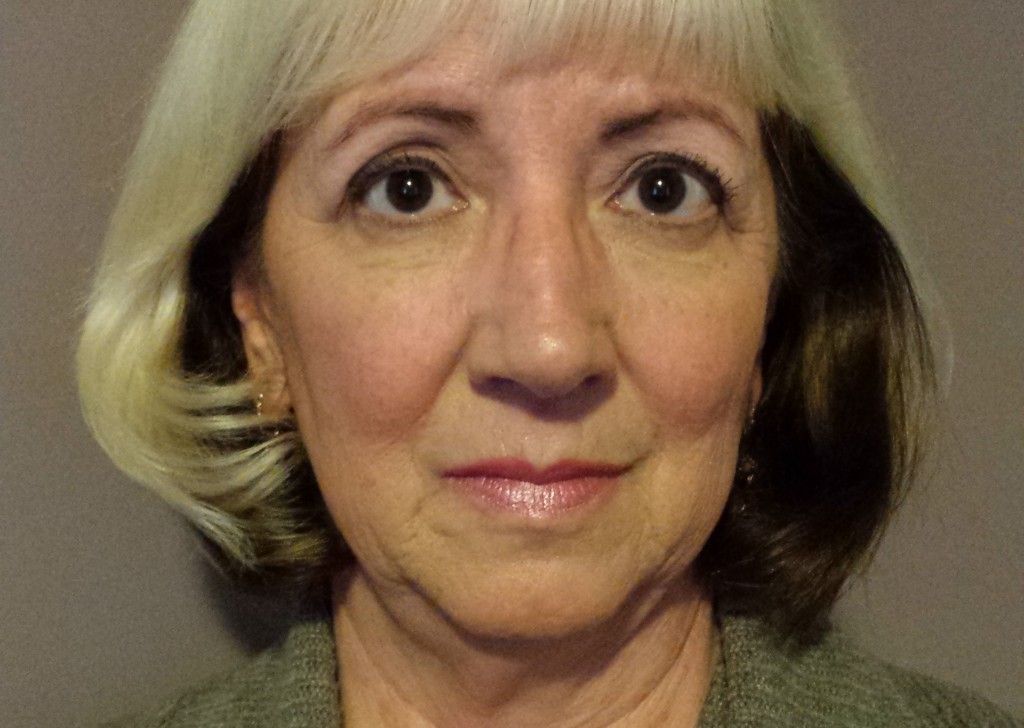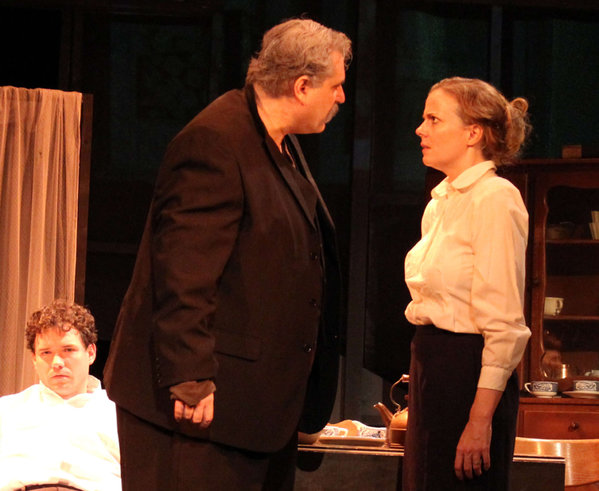The Irish Heritage Theatre in Philadelphia presents and preserves the rich legacy of Irish theater (Synge, O’Casey, Robinson, Boucicault, etc.) and Irish American theater (O’Neill, Kelly, Cohan, Harrigan, Hart, etc.). The IHT offers a wide range of Irish plays featuring its abundance of laughter, the emotional richness, and the inventive language, which brings out the depth of Irish theater.
IHT‘s latest production, JUNO AND THE PAYCOCK, is now onstage at Plays and Players Theater (read the Phindie review here). Its director, Peggy Mecham, teaches in the theater program at Community College of Philadelphia. She has directed over 25 productions at the College over the last 20 years and is the artistic director of Once More Theater. She holds a Ph.D. in performance studies from New York University.
Juno Boyle, the matriarch who holds the family together, often calls her husband, the delusional “Captain” Boyle, a peacock (“paycock”): “I killin’ meself workin’, an’ he sthruttin’ about from mornin’ till night like a paycock!” When things get out of hand, she tells him, point blank: “Your poor wife slavin’ to keep the bit in your mouth, an’ you gallivantin’ about all day like a paycock!”
Captain Boyle, the eternal procrastinator, dishes out this advice: “Get out o’ this! Get out o’ this at once. Ye’re nothin’ but a prognosticator, a procrastinator!” When his unmarried daughter becomes pregnant, the drunkard turns violent: “See that that lassie o’ yours is not here when I come back; for if I lay me eyes on her, I’ll lay my hands on her. An’ if I lay my hands on her, I’ll not be accountable for me actions.”
Henrik Eger interviews Peggy Mecham about JUNO AND THE PAYCOCK, the second part of playwright Sean O’Casey’s “Dublin Trilogy”, which is receiving a multi-year production by IHT.

Henrik Eger: What made you decide to produce the O’Casey trilogy?
Peggy Mecham: We chose O’Casey’s trilogy because we are hoping to produce The Plough in the Stars in the spring of 2016 in honor of the 100th anniversary of the Easter Rising which took place in April 1916. Having determined our interest in producing Plough, we thought what a marvelous opportunity to actually perform the entire trilogy. While individually very powerful, the plays collectively speak to the experiences of the people of Dublin through the six year period from the Easter Rising through the Irish struggle for independence and the trauma of the Irish Civil War.
Eger: We are experiencing a lot of turmoil in our own time, too.
Mecham: In our troubled world, it is important to remember that events are happening not in the news or somewhere else, but to real people. It has been very interesting to examine the similarities in the plays and also the effects of the turmoil—emotionally and practically. In each of the plays in the trilogy, [O’Casey presents] this extended conflict, caused in ordinary people’s lives, [and] explores how it changes. One of O’Casey’s greatest gifts as a playwright is the great sympathy and affection he feels for the Dublin people and his ability to make us care about them as well.
Eger: What makes the O’Casey trilogy still relevant today—psychologically and dramatically?
Mecham: All the plays in the trilogy have this intense, sharp moment of loss and that is such an abiding aspect of human experience that it makes the plays relevant and significant.
Eger: Juno, the wife and mother in JUNO AND THE PAYCOCK, has to handle a great deal of conflict.
Mecham: Juno explores the dynamics of the Boyle family and, even if the circumstances are not our own experience, they are familiar and topical. She offers a prayer to “take away this murderin’ hate” and there are so many places in the world where this lament could still be offered. We tend to think about the numbers of dead in a conflict without considering that the numbers represent a heartbreaking loss, not only the dead, but those who loved them.
Eger: Tell us about the actors you chose for this production—with Ethan Lipkin towering over everyone, literally, and with the petite Kirsten Quinn standing up to him in extraordinary ways.
Mecham: We were very fortunate that Kirsten Quinn agreed to play the role of Juno. Obviously, the role requires an actor who can explore and uncover the psychological complexity of Juno’s relationships and experiences. Kirsten gives a powerful and nuanced performance.
For Captain Boyle’s character we also needed a very strong actor to communicate both his relationship with Juno, [and] the sense of dependency found in the relationship between the Captain and Joxer [his sidekick]. If Juno is resilient, Boyle has been diminished by the years of conflict. Ethan [Lipkin] was able to really work with both sides of the character.
Kevin Rodden and Dexter Anderson played the leads in The Shadow of a Gunman, the first play of the trilogy we performed, and we were thrilled they were interested in continuing to work with the company again. Several other cast members, including John Cannon, Angelique Bouffiou, and Jimmy Guckin also appeared in Shadow.

Eger: The Irish Heritage Theatre is a small young company with a small budget. How did you manage to produce this play with its very large cast?
Mecham: One of the challenges for a young company is the large number of characters required for O’Casey’s plays and we are so happy that so many talented young actors in the city are interested in exploring O’Casey’s work.
Eger: How much is the Irish Heritage Theatre attracting non-theatre going audiences, especially from the Irish-American community and other groups in the Philadelphia area?
Mecham: The Irish Heritage Theatre is actively involved in outreach to the Philadelphia Irish community, through formal groups and publications, such as the Irish Network and the Irish Edition [Newspaper], and, informally, by distributing information about our work at Irish establishments throughout the city.
Eger: Tell us about your outreach to the Irish American community, and what are their responses?
Mecham: Kate Danaher, one of our Board members, is in constant contact with people from the Irish community and they in turn share information about our productions. We are very fortunate as a theatre company to have a constituency of people interested in Irish culture as well as attracting a more general theater audience.
Eger: What do you do to foster a better understanding of Irish culture and Irish theatre in Philadelphia area schools and universities?
Mecham: We are really planning to expand our outreach to area schools, colleges and universities. Classes from Rosemont [College], Villanova [University] and Community College of Philadelphia have attended our productions. We are developing a program with many schools in our region to share study materials with faculty and students at both the high school and college levels. The plays we produce would be of interest to theatre courses in world literature, as well as more specific Celtic literature [classes]. We also hold talkbacks after performances for audiences to have any opportunity to ask questions of those involved in creating the productions as well as share their reactions.
Eger: How do you see the future of the Irish Heritage Theatre here in Philadelphia?
Mecham: We are truly honored to be able to share the plays of Irish playwrights with Philadelphia audiences. The works are still important and audiences are interested in seeing these plays which would rarely be produced without a company dedicated to them. Each of our productions has grown in audience number and support.
Eger: Congratulations, comhghairdeas.
[Plays and Players, 1714 Delancey Place] October 15 – 31, 2015, irishheritagetheatre.org. Tickets.
